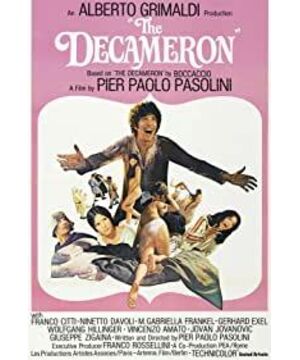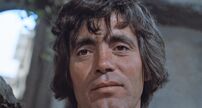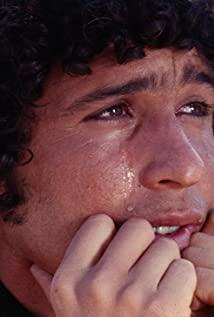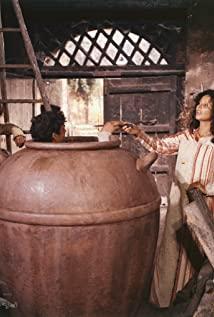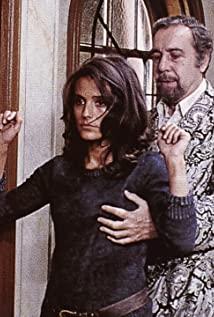In terms of ideological depth and influence alone, I am afraid that it is difficult for another person in Europe to be the right person of this critical realist master. It can be said that the realist masters in the world film industry nowadays, I am afraid that it is difficult for anyone to escape. To come out of Pasolini's shadow, he can transcend the influence of his critical thinking. To be precise, what I am going to talk about here is not the movie "Decameron", but Pasolini, the legendary Italian master director of the "post-neo-realism era".
"The Decameron", if the historical knowledge you learned in middle school has not been completely dedicated to the teachers, then you can know just by reading the title that this is an adaptation of the famous medieval writer Bo Jiaqiu's famous book of the same name. The film is the pioneering work of Pasolini's "Trilogy of Life" series (the other two are "Canterbury Tales" and "One Thousand and One Nights". These three works are also called " Erotic Trilogy"). There are a hundred stories in the original book. Pasolini carefully selected eight of the most representative ones. Among them, a man pretending to be a dumb man who entered the monastery in a pretentious manner suddenly opened his mouth and was given to them by the nuns. A satirical comedy by a man criticizing the hypocrisy of the clergy; a love tragedy in which a woman falls in love with a man and a woman’s elder brother kills the man because of their social class discrepancies; a woman tricks her husband into a wine barrel and then commits adultery next to the wine barrel A work of moral criticism; there are also a few people who found the treasure at the same time, deliberately trying to swallow the treasure, but ended up in the end, a light comedy with the most profound irony of ugly human nature.... In the film Pasolini shows us This is a huge secular painting in medieval Europe. Whether it is clothing, language, appearance, action, or local customs, customs and etiquette, this seemingly crude film can be seen everywhere with the director’s unique ingenuity, and it exposes and criticizes the inferiority of human nature. In the film, it can also be said to be unprecedentedly intense and profound. This film can be said to be unparalleled in the world film industry before it, and there are few people who can compare with it in the following decades. At the end of the film, Pasolini reverses the realism style before the film, inserts the story of traveling through hell in Dante’s "Divine Comedy", and uses exaggerated surrealism to describe the suffering and madness of hell, giving people a visual sense. The incomparable shock of the two-levels is used to express the extremely anxious worry about the deteriorating humanistic spirit and declining secular morality of this era, and at the same time, to express the extremely anxious worries and sound the most alarming bell. In the film, Pasolini adopted the most primitive shooting methods, using non-professional actors, unrestrainedly indulging in self-performance of the actors, conducting outdoor shooting on-site scenes, and using the original sound for the film dubbing without modification, not to mention the soundtrack. ; What breaks the taboo most is the undisguised depiction of eroticism in the film, and the naked line-drawing technique is adopted. Close-up shots of the male reproductive organs appear in the film. These styles have intensified in the subsequent series of films, and finally reached the peak in the dying masterpiece "Saro", launching a fierce attack on the lowest line of human physiology and morality.
When we discuss and understand the thoughts and pursuits of a certain director, there are often nothing more than two situations and methods. One is from the outside to the inside, that is, to study and ponder the director’s work first, and then draw conclusions from the work itself, thereby confirming the director’s own thoughts. There are many examples in contemporary film circles. The former Soviet director Tarkovsky He has always believed that it is his film that communicates with the audience, and the audience should understand the director itself from the work. In his film monograph "Sculpting Time", he once said: "The way the film director interacts with the audience is the film Unique.... I have already said that personal prejudices must be hidden: the presentation of personal prejudices may bring an immediate topic of discussion to a movie, but its meaning will also be limited to that short-lived effect. "And the second is from the inside out. You have to understand the director's own thoughts and beliefs, and know his growth background, so that you can better understand the director's work. There is no doubt that Pasolini is the most important of them. Typical. In his films, the audience can clearly feel the director’s own position and emotions, and know what he longs for and what he hates. For Pasolini, who believes in communism, he The love and hatred of Pasolini is very obvious. Although Pasolini’s life span, it’s not entirely possible to simply use the term “communist” to describe it, but there is no doubt that he has always suffered from standing at the lowest level of society. On the side of the poor people who are endlessly oppressed by the bourgeoisie, he himself has repeatedly expressed his position and loves and dislikes. Although Pasolini's entire life criticized the petty bourgeoisie and the middle class in the middle and upper classes of society, but Unfortunately, he himself came from a typical petty-bourgeois family. Pasolini has always felt ashamed about this: "I am a petty-bourgeois just like Moravia and Bertoruzzi. The molecule, in other words, is a shit. "Perhaps Pasolini is destined to be a contradictory mixture. This is reflected not only between his origin and his beliefs, but also after his fame. What he hates most in his life is also in his own film trying to criticize and criticize. His target is the middle class of society, but he is facing an unprecedented embarrassment: the movies he made, the people at the bottom of the society whom he sympathizes with neither have the conditions to watch nor the ability to understand, but become those of the middle class. Consumer objects are talked about by their enemies. The popularity of the film "Decameron" after the shooting proves this point. The petty bourgeoisie is eager for his film, and it was opened for a while. The first of fashion, the discussion of the frenzied vulgarity in his films was introduced as fashionable. For Pasolini, this is both unexpected and shameful. Among all the contradictions in him, I am afraid This is his most fundamental and most painful thing.
Pasolini is not only a director, but also a well-known poet and novelist. I have mentioned the term "contradictory mixture" many times above. Looking at Pasolini's life, it is really difficult to do otherwise. Find out another word that is more accurate than it. This is recognized in the world of film. Whenever people mention him, the first word that comes to mind is always "contradiction." As mentioned above, he was born in a petty bourgeois family in Italy. His father was a fascist officer and alcoholic, while his mother was a peasant woman who opposed Mussolini. He himself has repeatedly emphasized his identity as a Marxist and joined the Italian Communist Party when he was young. However, in 1949 he was expelled by the Communist Party of Italy on the grounds of "homosexuality." He never complained about this and always believed that he was A Marxist is proud; he claims to be a revolutionary leftist, but in the student movement of the 1960s he declared that he was on the side of the police, because in his opinion those so-called "movement revolutions" are only the petty bourgeoisie of society. This kind of purposeless impulse, and the police are the "sons of the poor." Almost every film of his has brought great controversy. In the early films, he was accused of "blasphemy" for "Soft Cheese" and sat in prison for two months. The film itself was only screened once before being imprisoned. It was banned forever, but soon two years later he described Christ as a proletarian revolutionist in the "Gospel of Matthew" and won the Catholic Film Award for telling biblical stories in the form of a proletarian revolutionary documentary. But the film However, it was strongly protested by almost all "progressive" leftists at the time. Pasolini later compared this film to Decameron: "The style and philosophy of these two films are completely indifferent-only sex has replaced Jesus Christ."
Pasolini’s early works mostly used myths and ancient legends as the blueprint to criticize the vulgar social atmosphere, but in the middle and late stages he became dissatisfied with this metaphorical means of confrontation, and began to directly attack the society he hated. For the middle class, "Decameron" is the earliest example of his type of work. In these films, the position of "sex" is very obvious and important. In his own words, it is "a political means of resisting the reification and alienation rule imposed by modern capitalism on the people." "The body is always revolutionary. , Because it represents the essence that cannot be coded.” (He is very similar to the Chinese writer Wang Xiaobo on this point). After completing the "Trilogy of Life" in 1975, Pasolini filmed the most shocking of his works, and it can also be described as the unprecedented film "120 Days of Sodom" in the world cinema. The film was adapted from the notorious French The original work of the same name by the erotic writer Thad, in which he exposed the darkest shadows and the most secretive aspects of human nature to audiences in the world with the most violent and bloody scenes, and put people's forbidden topics grandiose The desktop, the film is full of close-ups of twisted and perverted things, including violence, rape, sodomy, incest, group sex and even shit. There is no doubt that when the film first came out, it was resisted by the whole world and was banned in all countries without exception. However, it is strange that such a film has been repeatedly mentioned by people and cannot be forgotten by memory. In the book of the film researcher, the film is like a huge rock lying on the avenue, which can never be ignored and bypassed. This movie is also the director’s final success. On the eve of Halloween, Pasolini’s scarred body was found outside of Rome. The news broke, and the entire European literature and art world was shaken. His friend, Students and admirers, including Sartre, Bertolucci and Roland Barthes, held a grand funeral for him, calling him "Saint-Pierre Paul", and Pasolini This also became the first person in the history of film to devote himself to it.
Pasolini is not only a director, but also a well-known poet and novelist. As early as the 1950s, he wrote a novel "The Young Man of Life" that reflected the lives of the low-level people when he worked in a middle school in a Roman slum. "Excited Life", and also involved in the script, (Bertolucci’s debut "Reaper" was written by him). At the end of the 1950s, he published a collection of poems "Embers of Gramsci" and the novel "Life of Violence". It ranks among the greatest contemporary writers. He has been prosecuted more than 30 times for bad film and literary content, and his younger generations such as Bertolucci, Fellini, Polognini and others have been deeply influenced by him.
View more about The Decameron reviews


